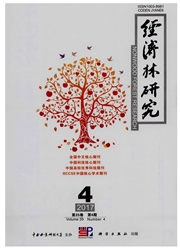

 中文摘要:
中文摘要:
为了遴选出影响灰枣果实矿物元素形成的关键因子,分别设计了树体阴阳面、遮阳、喷水及地表覆盖物等果园微气候处理方式,就不同处理下的气象因子及土壤碱解氮(N)、速效磷(P)、速效钾(K)、有机质(OM)及酸碱度(p H)对灰枣果实中的钙(Ca)、镁(Mg)、铁(Fe)、锌(Zn)、锰(Mn)和铜(Cu)等矿物元素的影响情况进行了试验,并采用显著性、通径系数及线性回归等分析方法,探究了枣果中矿物元素含量与气象因子及土壤养分因子之间的关系。结果表明:在一定范围内,p H值的升高,有利于枣果中Mg和Mn含量的增加;平均湿度相对较高,对枣果中Fe的含量有促进作用。土壤N含量能有效增加枣果中Cu的含量;枣果Ca含量的影响因素依次为平均湿度差、OM、N、平均最低温度及平均最小湿度,Ca含量与OM和平均最低温度间均有负相关,而与其他指标间均呈正相关;影响枣果Zn含量的因素依次为N、平均最低温度、平均湿度差、平均温度差和OM,其中Zn含量与N和OM间均存在负相关,而与上述其余各指标间均呈正相关。
 英文摘要:
英文摘要:
To select the key factors affecting formation of mineral elements in gray jujube fruit, the effects of orchard meteorological factors and soil nutrients on mineral elements contents in gray jujube fruits were studied. The orchard microclimate treatments included sunny side and night side of trees, shading, spraying water, surface coverings. The soil nutrients included alkali-hydrolysable nitrogen (N), available phosphorus (P), available potassium (K), organic matter (OM) and pH value. The mineral elements in fruits include on Ca, Mg, Fe, Zn, Mn and Cu. The relationship of the mineral elements contents in jujube fruits with meteorological factors and soil nutrients factors by using the methods of significance analysis, path coefficient and linear regression. The results showed that, the increase of pH value at a certain range was conducive to increase of Mg and Mn contents in jujube fruit, and higher average relative humidity could promote Fe content in jujube fruit. N content in soil could effectively increase Cu content in jujube fruit. The influencing factors of Ca content in jujube fruit in turn were average humidity difference, OM, N, average minimum temperature and average minimum humidity, which had negative relationship with OM and average minimum temperature and positive relationship with other indexes. The influencing factors of Zn content in jujube fruit in turn were N, average minimum temperature, average humidity difference, average temperature difference and OM, Zn content had negative correlation with N and OM and positive relationship with other indexes.
 同期刊论文项目
同期刊论文项目
 同项目期刊论文
同项目期刊论文
 期刊信息
期刊信息
